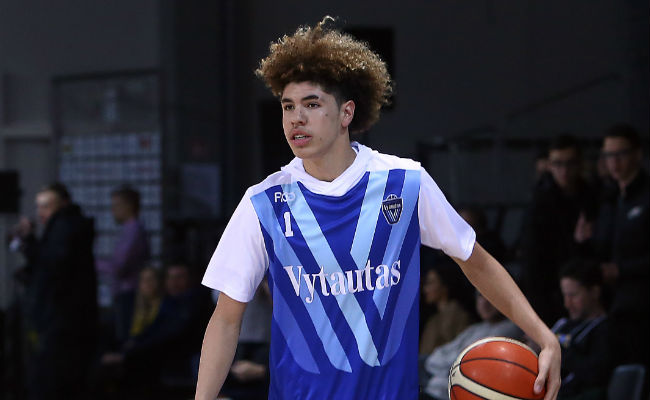
The highlights of the Ball family’s excursion to Lithuania appear to be much different than the reality of the situation, especially for LaMelo Ball. The family’s reality show, ‘Ball In The Family’, is highlighting the sudden pro careers of LiAngelo and LaMelo Ball, which includes their father coaching them.
But the experience with Prienai-Birstonas Vytautas, the low-level pro team the Balls signed for last year, has been much more trying than it appears from afar. Mirin Fader went to Lithuania to see for herself and wrote about it for Bleacher Report and the piece is full of little moments that show just how different — and sometimes absurd — the whole experiment truly is.
The piece focuses on how LaMelo Ball, just 16, is adjusting to live in Lithuania and as the youngest American pro playing internationally. The main thrust of the piece is that it’s not going exactly as the family’s Facebook reality show indicates, providing context for the games Melo is appearing in and the world in which he currently resides.
When Fader asked someone who actually knows the Lithuanian basketball scene, for example, they explained how any numbers the Balls have put up over there are basically imaginary.
The Challenge is five games against second-rate teams (two of them amateur) to guarantee minutes for Melo and Gelo, who log far fewer minutes in the more challenging portion of the team’s schedule, the Lithuanian Basketball League (LKL).
“It is just a joke,” Steponas Kairys, a Lithuanian coach who helped establish the LKL in 1993, tells me. He calls the Balls’ Lithuania experience a “show,” especially in that the team can guarantee playing time for the brothers without their earning it first. “It’s not real. It’s not honest.”
One team employee called the Balls the “best thing to happen to Lithuania in 10 years,” but not every outlook is so rosy. LaVar himself even said the plan was to put his sons in a place where they would stand out and not just be another “pea in the pod,” choosing the spotlight over better potential development and competition.
Then there’s the location itself. Lithuania in winter seems like a tough place to live. The language barrier doesn’t help. Food is repetitive and bland, and some of the descriptions of life in Lithuania, especially when compared to where Ball has spent his entire life in the suburbs of Los Angeles, are downright bleak.
Few people speak English. Oftentimes, meals at the Vytautas Mineral SPA hotel, where the family is staying, consist of pork, cabbage and potatoes. Again and again. The mini chocolate chip croissants are stale. There are no movie theatres, no malls, no taco trucks like the ones in Los Angeles, where I live. And certainly no Lamborghinis like the black one Melo received when he celebrated his 16th birthday in Chino. It takes me 10 minutes to scrape off all the ice on my Toyota Corolla rental. I laugh, imagining if Melo had to do the same for his Lambo.
The piece is a fascinating look at the whole excursion, as well as an examination of whether going pro is actually helping LaMelo become the NBA player he and his family are determined to make him. The problem, as Fader points out, is that LaMelo is actually being far more insulated in Lithuania because of his father’s influence over the team, decision-making and even scheduling than he should be if the idea is to get him real experience overseas. LaVar regularly barks at the coaching staff to put him back in the game, and in practices he’s rarely ever pushed.
When Melo arrived in Prienai, his new team shockingly didn’t seem interested in challenging him on the court. I observed him at daily practices and games for three weeks, and in that time I didn’t see him or his teammates run a single suicide or timed up-and-back sprint. I didn’t see any punishment for blown layups or defensive errors, either. And games were scheduled against lesser opponents.
How can Melo soar when his father has cleared any hurdle that might come his way?
When pressed as to whether he’s avoided getting onto Melo in practices and games for his propensity to chuck shots and make poor decisions (as 16 year olds are wont to do), the team’s head coach Virginijus Seskus told Fader, “Yeah, there is some truth in it.” Fader goes on to note that there have been some moments where LaMelo has appeared to show some growth as a player beyond being the unrepentant chucker he was known as off in Chino Hills thanks to YouTube highlight clips of him launching threes. He still fires those off, but Fader points out a few moments where it’s apparent his basketball IQ is growing, but maybe not as rapidly as it could if LaVar allowed the training wheels to come off completely.
While the path is unique, it seems in some ways to be the path of least resistance, as Melo isn’t exactly being challenged in many ways other than finding things to do and good food to eat and any development or growth of his basketball skills seems to be stunted by the insistence of LaVar to constantly put him in desirable situations, even thousands of miles from home.






